#because even throughout his ENTIRE myth he hides how unprepared
Explore tagged Tumblr posts
Text

I was gonna hold myself back but the tags gave me brainworms, so I had to babble more like the stupid obsessive that I am.
Sylus is a strong person, incredibly powerful, intelligent on another level, capable of fighting wars alone because he knows how to conquer and destroy like a general should. He is a warlord, a highly powerful criminal, its even suggested in his anecdote that he LET himself be captured. (No one understands how any of the Philos authorities finally got their hands on him, and then how he just up and avoided them afterwards.)
He quotes the art of war, he talks about the ephemerality of the soul, he is beyond a doubt a very capable person.
He's also a scared boy, who lost his entire family, and was raised in a way where his entire view of himself shattered into nothing, because of the change to his identity that he never truly managed to process.
Sylus has very little sense of self in the same way others do, because he doesn't *know* who he is. He was a human, then he was a dragon, then he was caged, then he was freed. Then he was a tool for MC's vengeance, then he was a criminal, then he was the Sylus of the N109 Zone.
He took a name on from the one person who didn't see him as a monster, because its the closest thing he's ever had to an anchor of being.
But because of that his entire sense of self and perception ends up tied up in this person who he chased through worlds. (Literally coming through the deepspace tunnel to find them).
Whenever he talks about himself, he calls himself a monster. He says he was worse than a wanderer. Actively parroting back the propaganda spread about him by the Justiciars, because fundamentally he believes that to be true. (And perhaps what happened at the end of his myth affirmed that for him.)
He's so terribly incredible but so horrifically insecure because his entire perception of self is wrapped up in what other people have told him.
The only parts of him that aren't tied up in that horror of being a monster, is what MC has told him.
He'd break his back to be something for them, because he has no idea how to be him, because he was never given that chance.
After all, he was born into apocalyptic terror, people cursed his existence and fabricated his sins.
Thinking about Goodcat code again. Thinking about how Sylus has said more than once 'would you still like me if I wasn't wild' because he was your dragon, and you fell in love while chasing revenge with a 'wild beast' at your side.
Thinking about how Sylus uses other people (primarily Mephisto) as a cover for his feelings. 'Mephisto gets separation anxiety, can I visit too' 'Mephisto misses you, so I called you'.
'Snowy Owl prefers men who are obedient', the nod to himself, the act he puts on despite wanting nothing to do with Snowy Owl. The question in his eyes, is this what you want? Do you want me at your feet?
Who do you want me to be?
Is this really all about another person, or do you want me to be someone else?
#sylus is absolutely an insecure man#its why he seeks out praise so actively#why he wants mc to want to spend time with him#he's self assured because its a cover for weakness#because even throughout his ENTIRE myth he hides how unprepared#how incapable he feels#hides how little he actually knows about who and WHAT he is#thank you for leaving these tags because i made myself cry#GONNA GO AND THINK ABOUT THE CARD RELEASES FOR TOMORROW INSTEAD OF SOBBING OVER SAD FEELINGS I HATE THIS#love and deepspace#sylus#sylus lnds#sylus lads#wonder babbles#also only semi related but becoming a dragon as a metaphor for grief and loss is very much agonising.
136 notes
·
View notes
Text
Inanna: Relevance and Return
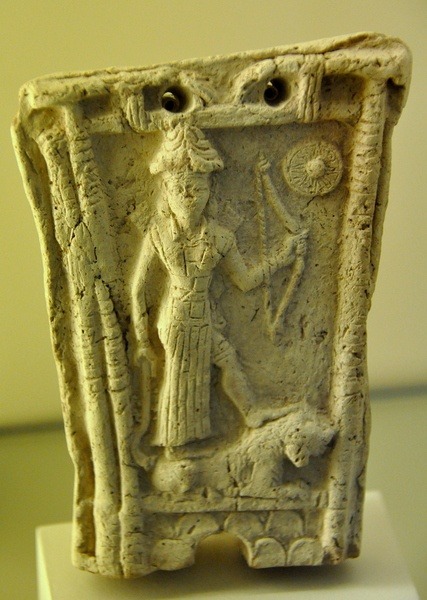
The Sumerian Goddess Inanna came to the notice of modern women in 1983 when Diane Wolkstein and Samuel Kramer published Inanna: Queen of Heaven and Earth. But she first appeared in recorded history about 5,500 years ago. Written myths are almost always pre-dated by many generations of oral traditions, so it plausible to assume that her stories were passed down orally through many generations before writing became extant. Throughout the centuries she has morphed and changed as she moved from culture to culture, empire to nation. Over the years Inanna became Ishtar, Asherah, Astarte, Astoreth, Aphrodite, Ainina, Danina, and possibly Dali of the Georgians. Her worship died out slowly in the Middle East between the third and fifth centuries A.D., but she left her mark in Marion theology with hymns of lamentation attributed to Mary, but taken straight from Inanna’s lamentations for Damuzi.
Inanna was the goddess of sexual love and war. She was fierce, conniving, intelligent: quick to anger, but just as quick to reward loyalty. There are many stories about her, such as The Epic of Gilgamesh, Inanna and the Huluppu-Tree, Inanna and the God of Wisdom, The Courtship of Inanna, and The Descent of Inanna. It was the latter that caught and held the interest of women involved in Goddess Spirituality.
Although the myth is titled The Descent of Inanna the salient point is actually her return. The tale begins with Inanna’s decision to visit the underworld to meet her sister Ereshkigal, Queen of the Underworld, who is mourning her dead husband. Bad blood exists between the sisters—Inanna has been instrumental in the death of The Bull of Heaven. The other gods gossip about Inanna, speculating about her motives—perhaps she wishes to make peace with her sister, perhaps she wishes to steal her powers, but Inanna keeps her own counsel and determines to go alone.
Wisely, before she goes, Inanna concocts a plan with her trusted handmaiden, Ninshubar, giving her explicit instructions about what to do if her mistress does not return. Then, girding herself with seven powers, she rides away, driving her own chariot toward the underworld.
On hearing of Inanna’s arrival, Ereshkigal orders the gatekeeper to close the seven gates of her palace. As Inanna requests passage through each gate, she must divest herself of one of her powers. In the end she arrives in Ereshkigal’s hall naked. Her arrival coincides with the entrance of the judges of the underworld. They sentence her to death and stick her body on a meat hook, where it hangs for three days and three nights.
Meanwhile, Ninshubar has begun making the rounds of the gods. Each one turns her down until she reaches Inanna’s father, Enki. Enki heeds Ninshubar’s plea. He scrapes dirt from beneath his fingernails. Mixing it with a little spittle, he fashions two tiny winged creatures called gala to sneak past the gatekeeper and fly down into Ereshkigal’s realm. To one he gives the life-giving plant and to the other the life-giving water. He whispers instructions in their ear and sends them on their way.
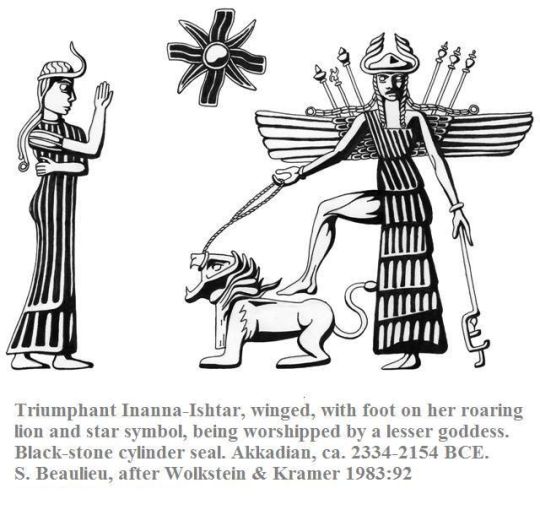
Down in the underworld Ereshkigal continues to mourn, wailing unceasingly day and night. She is pregnant with her dead husband’s child. When the gala find Ereshkigal they hover by her ears and mourn with her. When she groans, “Oh, my liver!” they groan, “Oh, my liver!” When she cries, “Oh, my heart!” they cry, “Oh, my heart!” Ereshkigal is so grateful to be heard and comforted on her own terms that she offers them anything they desire. Following Enki’s instructions, they ask for the body of Inanna. Anointing her with the precious life-giving water and plant, the galas restore Inanna to life and together they set out on the journey home.
Once again, however, the judges intervene and refuse Inanna passage unless she finds someone to take her place in the underworld. She promises to find a replacement and, accompanied by a posse of enforcing demons, she storms up into the sunlight.
Thus begins a round of visits to Inanna’s hairdresser, her son, and her brother, all of whom have mourned her with the proper mourning rites. Faithful Ninshubar offers to take Inanna’s place but the goddess vehemently refuses. Finally they come to Inanna’s consort, Damuzi, who has barely noted her absence. He is sitting under a fig tree, feasting. Inanna, incensed at his indifference, orders the demons to grab him. But Damuzi calls upon Utu, the sun god, Inanna’s brother, to honor an old debt and rescue him. Utu helps him escape the demons and he manages to hide. The demons, however, are relentless in their pursuit and eventually run him to ground
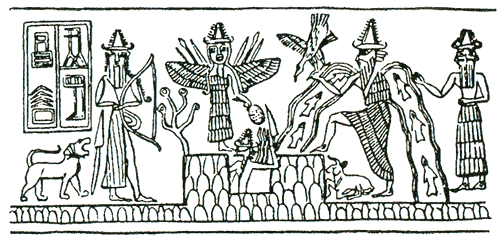
Even then, his luck holds. Damuzi’s adoring sister intervenes and begs for his life, promising to take his place underground for half of every year. Tired of the whole business and possibly half-inclined to take Damuzi back, Inanna agrees.
This is a complicated tale, dovetailing and interweaving in places with other cycles and creatures of myth. It is a multilevel teaching story, depicting what Joseph Campbell called the hero’s journey; explicit directions on how to properly mourn a death; the advantage of prior planning; faithful service; parental love; the courage to face the unknown and the bad consequences inherent in wrong action. Lots of information to be packed, condensed and synthesized into one fabulous story.
At every level this myth resounds with true situations in which humans of every age find themselves. But it specifically appeals to modern women, because in Inanna we find a heroine who predates the extremes of patriarchal culture in which we find ourselves enmeshed today. She acts independently, while remaining in good relationship with men—her father, brother, and hairdresser. She has a strong, solid friend and ally in Ninshubar. She is not afraid to face the unknown and perseveres in the face of loss and sacrifice. Like many women she struggles in relationship with her mate.
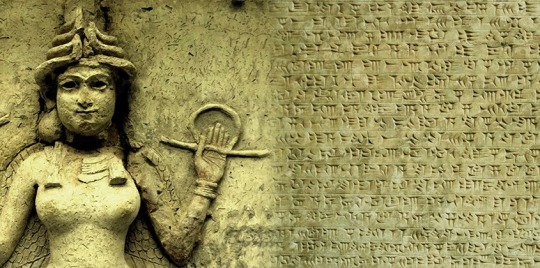
But the part of the story with which women resonate most strongly is the journey of relinquishment, the egoic death, and the restoration of power. Using this part of the myth, circles of women have been manifesting and enacting their own rituals of letting go, creating space, and allowing new ways of seeing and being to take the place of what no longer serves them.
Sometimes the journeys are entirely imaginary, taking place as guided meditations in quiet, dimly lit rooms. Sometimes women build metaphorical gates as simple as seven scarves laid in rows across a room. Sometimes the gates are more elaborate structures, painted and adorned.
The gates may be assigned particular attributes—names, colors, stones, trees, etc. The seven chakras lend themselves particularly well to this rite. Furthermore, the descent and return may be pinned to a particular life passage like a marriage, a birth, the loss of a job or start of a new career, the death of a beloved mate, child, pet, or friend. It works well for any occasion that requires a relinquishment or some kind of death but also offers renewal and restoration.
In every ceremony I’ve been privy to or had described to me, there is always a time of study and preparation. Women do not undertake such a ritual unprepared or in ignorance of what it means. Always the gatekeepers remain present and aware, careful to gauge the mood of the group and the progress of each participant.
Inanna, with her link to sex and death, is not to be invoked without safeguards in place. Her myth specifically calls for opening the doors between the conscious and unconscious mind incrementally and ceremoniously. The story warns us that the journey is a long and dangerous one, a risky business that requires gravitas and can involve tears, howls, vomit, diarrhea, or ecstasy.
The Descent offers a chance to look clearly at tired habits of thought and action. A woman may finally admit to an addiction or see how some long-denied pattern of action has failed her time and again. The Return offers a chance for something to be born or recovered. A woman may reclaim a talent or a forgotten dream, put aside years before, that suddenly offers itself, once more, as a viable choice. The possibilities are endless and unique to each individual on the journey. The point is change.
The Goddess, in every form she takes, is all about change. Inanna, the Queen of Heaven, replete with every kind of talent, adoration, and power, begins her journey because of a desire to change. We don’t know why. Often in old teaching tales the questions left unanswered hold their own secret wisdom.
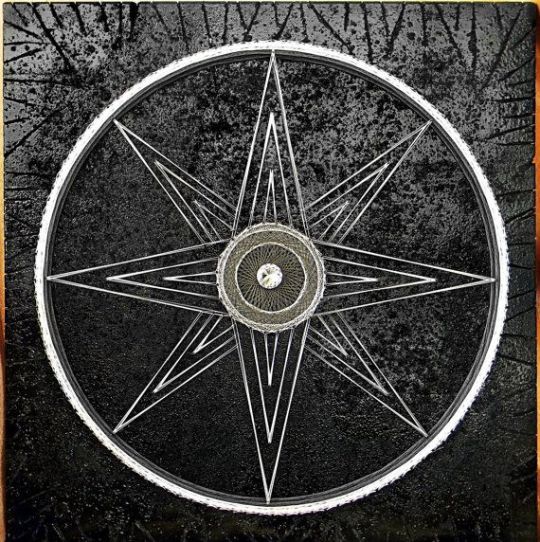
Perhaps she doesn’t know. Perhaps she longs for mystery. Undoubtedly she is aware that in undertaking this journey nothing will ever be the same again. The point is she decides on change and then rides out to meet it. A wise woman once told me, “Change or die!” At the time she terrified me and I had no idea what she meant or why she would say such a terrible thing. But her words continued to ring in my ears through the years every time I had a choice, every time a risk presented itself or a circumstance demanded courage. Her directive did indeed change my life and always for the better, though at times it took a little hindsight to understand how.
Inanna’s descent and return exemplify the “both and” inherent in Goddess Spirituality. One may change one’s self and hence the surrounding world both by releasing and/or embracing. Possibly, yesterday’s release will one day become tomorrow’s embrace or vice versa. The journey is an ongoing process of dismantling and rebuilding that goes on throughout life. Inanna’s ritual gives us focus, a sacred space in which to step out of time and consciously enact a psychological process that one way or another life will force us to undertake anyway. Engaging in it willingly, we emerge chastened, humble, and radiant, suffused with the power and strength of an ancient archetype. Inanna returns in glory to walk the world anew, as she has so many times before.
90 notes
·
View notes
Text
A History Of Gods
Finally, I have got around to writing out the history of the gods in my WIP “Story with Gods” (which still needs a title). Below the read more please enjoy 2000 words explaining how Zeus’s kingdom came to be in the Americas, and how he was subsequently overthrown. The history is based on real-world events but includes my own spin on things. Find out how Zeus became a god, how Christianity changed the lives of the gods, and why Zeus is no longer allowed to step foot in Europe! @novelistcore , here it is, hope you enjoy!
Zeus, Poseidon, and Hades (or, as I tend to call them, the “Big Three” Olympian gods) hail from the early independent settlements on mainland Greece. These settlements, eventually developing into what is now known as Mycenaean Greece, had a culture based on warfare and raids, warriors were highly celebrated within their communities. As humans, the Big Three all met their doom at the same battle between two larger settlements at some point between 1800 and 1700 BCE. Zeus and Poseidon were opposing leaders, Zeus was in charge of the raiding warriors, and Poseidon was in charge of the defence. Hades was foot-soldier fighting under Poseidon. The battle left massive carnage on both sides, though the defending settlement held out in the end. Unfortunately, among those to lose their lives were Zeus, Poseidon, and Hades, whose bodies were left in the field where their human lives had ended.
Soon after, Zeus found himself awake again, and he was thoroughly confused. All around him were the bodies of his men; he knew that, by all means, he should have been dead. But he wasn’t. He wandered the battlefield, looking at the corpses and thinking to himself. Eventually, he stumbled across a soldier who was sitting up and staring around him with horror in his eyes. This was Hades, whose godly abilities (often unfortunately) mean he can see ghosts. As Zeus tried to question Hades, they were approached by an equally confused Poseidon. Unsure what to do with themselves, the three banded together and headed toward the town.
In the town, Poseidon tried to question his men, but they either fled in fear or knelt down in reverence. They had seen their commander die yet now he stood before them. Poseidon urged them to speak, but they were in too much awe to respond in much depth. The three men soon found out that they had indeed been dead. The inhabitants of the settlement began to offer gifts of appeasement and even sacrifices to the three men who had returned from the dead. With the exception of Hades, they accepted these gifts and their new reputation as something more than human. As their powers developed, they left the town for fear of hurting its people. They wandered the countryside and interacted casually with anyone who happened to cross their paths. Whenever they came across scenes of death, they would gather anyone who happened to, well, not to stay dead. Soon, they had a fair group of them who travelled together, and legends grew.
These legends, plus the exaggerated stories the young gods would tell, soon grew into the basis of what we know as Greek mythology. As the myths spread, the stories became more and more exaggerated, and the humans of the land began to truly worship them.
Along came the Romans in 146 BCE. The gods, who had continued to build a kingdom amongst themselves, interacted freely with the Romans as well, many of them earning themselves new names in Roman mythology. Zeus’s domain over the gods spread with the Roman Empire (and he ruled in mighty Roman fashion). Not all of the humans who were reborn in this time supported Zeus, however, and some (arguably accidentally) made quite a name for themselves in the way they interacted with humans. Particularly those with a somewhat rebellious tendency, such as one who you may have heard of… Jesus Christ.
Humans loved Jesus and the stories he would tell of one all-powerful god (and that god being his dad), but man did the other gods hate him and the shit he was always stirring up. Some of the gods even had Jesus crucified, hoping that he wasn’t powerful enough to be immortal. Unfortunately, he is immortal, and his ‘resurrection’ just brought him more support from the humans. Under jealous Zeus’s influence, Christians were heavily persecuted in Rome, and it was even a fun pastime for the Romans to feed Christians to lions.
In 313 CE, Christianity was legalized in Rome, and Zeus lost his hold over the Roman Empire. Zeus tried to push his control over the gods northward, but many of the gods were now fighting over whether or not they should interact with humans, the general consensus was no, they should draw back and avoid humans. In 391 CE, the worship of other gods was made illegal, and Christianity began to persecute any gods who dared show their abilities.
Behind the scenes of human life, Zeus and those who supported him continued to rule the kingdom of the gods. Zeus was still very attached to his conquesting culture and spread his reach throughout the gods of Europe. Most either accepted Zeus’s claim to rule because they did not care (or were even beginning to fear the humans) or simply ignored Zeus and went about their lives unchanged. The gods present in the east had their own kingdom, and Zeus would not dare touch it as, though he would never admit it, he was afraid of them.
As Christianity spread, Zeus was bottle-necked, and it was becoming harder to exert his rule over the other gods while still staying in hiding. The gods he wanted to rule were afraid or simply trying to disappear as the punishment against non-Christians grew.
Eventually, Zeus pushed too far north (largely on the part of the Holy Roman Empire) and ended up in the territory of the Norse gods’ kingdom. Understandably, Odin was fucking pissed that Zeus would try to claim control over his land and they fought brutally, often around Denmark, for hundreds of years. It seemed Zeus was succeeding, he reluctantly used the Holy Roman Empire’s forces in his fights, but Odin knows warfare, and with time, the empire began to fracture, putting Zeus in a delicate position. Their fights culminated in the Thirty Years’ War, one of the most destructive conflicts in human history. Odin’s forces won out, and Zeus and his supporters were banished to the New World.
Many of the gods dropped their allegiance to Zeus and stayed in Europe, living under Odin who now had claim to rule over most of the gods in Europe. Very few gods were allowed/would bother to travel between the Americas and Europe (Loki was one, so was Ares because Odin liked him), which meant that Zeus’s kingdom now consisted of very few subjects. The most notable figures who stuck with Zeus in the Americas are Poseidon, Hades, Apollo, Artemis, and Hephaestus, among others. Both Hera and Athena came along for a short while but soon returned to Europe.
Zeus journeyed around the Americas and announced his kingdom to all who would listen. He quite liked the Americas because few protested his rule (the gods who were there already did not give a shit, many were older and more powerful than Zeus anyways, and they thought of him as a child and let him do whatever). Those who did protest found their support from humans quickly wiped away by Zeus’s subtle influence over the colonizers. (Zeus is a dick if you didn’t already know this.) As the population grew in the New World so did the number of deaths and therefore the number of rebirths, allowing Zeus to expand his kingdom through new gods who didn’t know enough to rebel against him.
In the New World, Zeus didn’t have to care about Christianity as much because by this point it was super distorted (and also Jesus was back in Europe hiding from Odin’s wrath at all the shit he had caused). When Zeus’s kingdom first arrived in the New World, they did make some mistakes and ended up causing some witch hunts and similar incidents, but as time passed, they developed ways to stay better hidden while still having their hands in human business.
In the mid 18th century, Odin sent a group of gods to check on Zeus and ensure he wasn’t planning anything drastic. Zeus got pissed at this disrespect which basically resulted in the American Revolution (where my asshole oc Rylan ends up reborn). Zeus hoped that the separation of the U.S. (and eventually the rest of the Americas, though that took time and wasn’t always entirely successful) would help prevent Odin from meddling in Zeus’s affairs. Most significant wars between anywhere in North or South America and Europe were symptoms of Zeus’s continual bickering with Odin across the sea.
Then comes the American Civil War, a conflict that Zeus did not expect.
By this point, a charming young god named Rylan had gathered the support of many other young gods across the U.S. Zeus was an unquestionably harsh ruler, often abusing his people and keeping strict rules on how the gods could act or even use their abilities (arguably these rules were for their protection from the humans). Rylan represented something new, something different. His radical ideas sparked dreams in the minds of young gods who thought they ought to have more power than they did. Rylan, however, also represented a great risk.
Rylan is a rebirth of Loki, god of fire, tricksters, deceit, and chaos. Loki is often described as having a silver tongue, able to manipulate even the most resilient. This trait is not something Rylan was lacking; his charisma meant that those who supported him supported him wholeheartedly and had no hesitation to follow through even on his craziest plans. He may not have been a god of war or strategy, but he had a tendency for reckless insanity that gave him the advantage of surprise.
Zeus wasn’t ready for the opposition from so close to home, his supporters fought as well as they could, but their forces were unprepared, and Rylan soon took the throne (there wasn’t a literal throne at the time, that didn’t exist until Rylan built his palace/base).
There’s been a whole lot of fighting back and forth ever since as Zeus tries to reclaim leadership, but Rylan has support and knows how to delegate, so he has gods helping him with strategy and organization. The gods are downright terrified of Rylan in a way they never were of Zeus. Rylan is a horrible king. He is just as power hungry and controlling as Zeus but lacks any remorse or sympathy for his subjects. Most gods are too scared to fight back and find themselves stuck fighting for King Rylan, rather than risking the consequences of going against him.
Zeus’s support has bases across the Americas where they continue to put up a resistance, but their numbers are dwindling, and they can’t seem to recruit anymore. As their forces shrink, King Rylan’s forces grow. He has a system of recruitment centres set up all over the continent that operate in a variety of ways, but all of them are built to kill humans and recruit those who are reborn as gods (as well as test those rebirths to tell how powerful they are and assign them their rank in the army). These recruitment centres bring in new foot-soldiers in mass numbers, mostly gods who are not overly powerful, most of them hardly more than human. It takes a great deal of power to be immortal and so, to Rylan, these lower-level gods are disposable playthings he can use to build up his kingdom. When the system does find a more powerful god, Rylan is quick to give them a position of significant power in the kingdom.
King Rylan’s fighting tactics are brutal and insane. He takes advantage of the natural chaos in human life to gain advantages among the gods, but he also causes chaos himself. For example, one of Zeus’s bases used to be in New York City. Zeus himself was staying there for some time about seventeen years ago. Rylan’s informants found Zeus’s location; they also found some plans that Rylan was quick to use to his advantage. Amidst the chaos of the greatest tragedy in modern America, Zeus was captured by Rylan’s forces. Zeus and his supporters had rushed immediately to help in any way they could; it wasn’t until days later that Apollo realized that Zeus was missing.
And that brings us to the beginning of my WIP. The war seems like a lost cause. Zeus’s supporters are few and far between, hanging on by a thread. Most are in hiding; some are still trying to plot and plan, still trying desperately to find Zeus. Trying to find any shred of hope that the tides of the war could change. Then they intercept some news from one Rylan’s recruitment centres.
The three most powerful rebirths in centuries have been found.
#west's words#writeblr#worldbuilding#history#mythology#Story with Gods#the world of gods#the Big Three#King Rylan#Zeus is an ass#but Rylan is undoubtedly worse#fun choices for king right?#I need to go through all my posts and make sure everything is tagged properly for this WIP#and also tag characters#so that you guys to scroll through stuff if you end up interested
8 notes
·
View notes